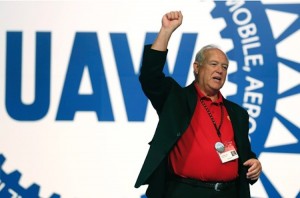The United Auto Workers plans to canvas union members to see how the proposed contract with General Motors can be modified to secure approval from the skilled trades unit, who voted overwhelmingly against ratifying the deal.
The rejection by the skilled trades means the contract with GM has not been ratified even though a majority GM’s workforce voted to accept the new contract, the union said in statement.
Overall, 55.4% of GM’s UAW workers voted to approve the contract. Production workers voted 58% for the deal while skilled trades workers, who are fewer in number, voted 59.5% against. The union’s decision means it does not yet have a new labor pact with GM, which has been silent about revolt by workers in the skilled trades.
The union has not deemed the tentative agreement with the automaker ratified, the union said in its announcement of the vote. In accordance with the UAW’s constitution and applicable administrative guidance, the UAW “will hold meetings with its UAW-GM Skilled Trades membership at each worksite over the next several days in order to determine what reason(s) they had for rejection of the tentative agreement,” the union statement said.
Skilled trades workers appear to scuttled the deal over specific contract language that would have allowed GM to continue whittling away at job classifications, while requiring individual employees to perform work outside their specific expertise. Some of the skilled trades at GM voted against the tentative agreement because the expected a larger wage increase, observers said.
However, the rejection by the skilled trades at GM is likely to cast a shadow over the ratification vote among union members at the Ford Motor Co. where workers are scheduled to begin voting on a new tentative contract, following a meeting of the UAW’s Ford Council in Detroit this week.
(UAW facing tight vote on proposed GM pact. For more, Click Here.)
In September, workers at FCA U.S. decisively voted against a contract proposal forwarded for ratification by the UAW’s leadership. The rejection forced the company and the union to negotiate a second agreement, which was ratified and which now serves at the pattern for the union’s agreements with GM and Ford.
The Ford Council is expected to endorse the tentative contract, which follows the basic pattern established at GM and FCA U.S., but includes a richer signing bonus and a small increase in retiree pensions.
(Click Here for details about the new GM-UAW contract.)
The results of this process cannot change aspects of the agreement that are common to all members, including the $8,000 signing bonus and the new wage schedule that phases out the wage discrepancy between first- and second-tier or newly hired workers after an eight-year grow-in period. The grow-in period for new hire is retroactive to 2011.
Following the meetings with skilled workers, such as electricians and millwrights, the UAW’s International Executive Board shall meet to determine what steps to take next. The union’s executive board was heavily criticized in 2011 when it ruled the new contract with Chrysler was ratified even though the skilled trades had voted to reject the contract.
(To see more about the tentative deal between Ford and the UAW, Click Here.)
Mindful of the 2011 controversy, which alienated many union members, UAW President Dennis Williams has made a concerted effort to be more transparent in the handling of the ratification process. The union also faces pressure from new “Right To Work” laws in places, such as Michigan, that make it easier for employees to stop paying union dues.


UAW leadership looks bad two ways in these negotiations. First, leadership clearly had no idea what the membership expected. Second, management’s swift acquiescence to sweetening the deals after rank-and-file rejections indicates union negotiators probably blinked at the table.
This is the first time I’ve seen such poor contracts offered to the UAW employees. Maybe it’s time for some new negotiators based on the absurd discrimination against new hires as well as many senior level employees?